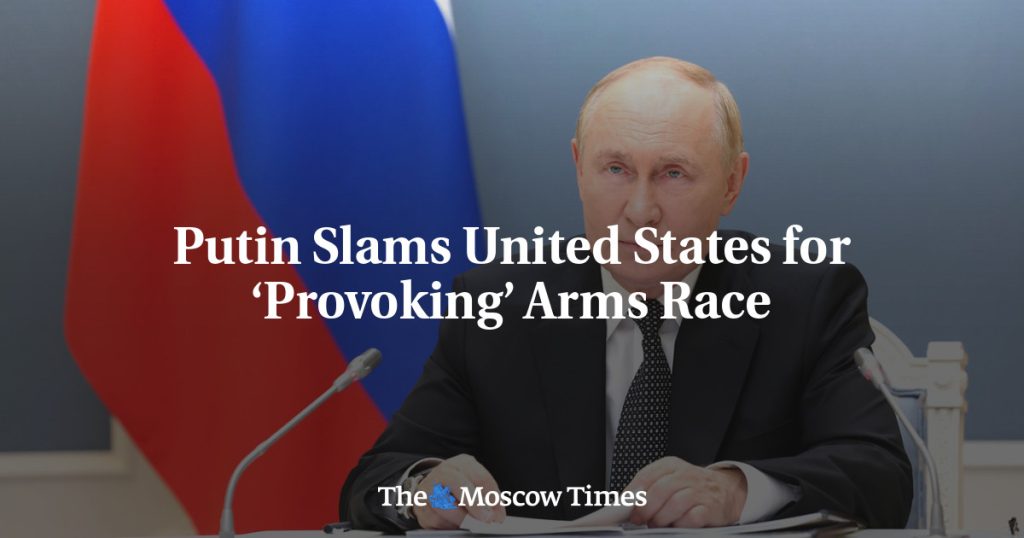Russian President Vladimir Putin accused the United States of increasing its military presence near Russia’s borders, leading to an arms race. The Kremlin leader made these remarks during the start of week-long strategic naval exercises, during which Russia plans to enhance cooperation with partner countries. Hundreds of warships, submarines, and support vessels are expected to be deployed across various oceans and seas between September 10 and September 16. This comes in response to the U.S. showing interest in deploying Typhoon missile systems to Japan for joint military exercises and deploying the same midrange missile system for joint military exercises in the northern Philippines.
Putin criticized Washington’s “aggressive actions,” warning that they may break the established security architecture and the balance of power in the Asia-Pacific region. He accused the U.S. of provoking an arms race and creating a dangerous crisis situation by increasing military presence near Russia’s borders under the guise of countering alleged threats from Russia and China. The Ocean-2024 naval exercises, conducted in conjunction with the Chinese navy in the Sea of Japan, are aimed at strengthening military cooperation with friendly states and repelling possible military aggression in all areas, including oceans and seas. Putin emphasized the importance of Russia being prepared for any scenario and ensuring the protection of sovereignty and national interests through its armed forces.
In July, Putin had threatened to resume the production of intermediate-range nuclear weapons if the U.S. confirmed its plans to deploy missiles to Europe, including Typhoon and Tomahawk cruise missiles. The Kremlin warned that such deployment would make European capitals targets for Russian missiles, escalating tensions further. The situation highlights the ongoing arms race and military tensions between Russia and the United States, with both countries engaging in strategic military maneuvers and actions that risk destabilizing the region. Putin’s statements reflect Russia’s commitment to defending its sovereignty and national interests in the face of perceived threats from the U.S. and its allies.
The escalating tensions and military posturing between Russia and the United States risk exacerbating the already fragile security situation in the region, with both countries engaging in provocative actions that could lead to a dangerous confrontation. The ongoing strategic naval exercises and deployment of missile systems indicate a deepening distrust and hostility between the two nations, threatening to undermine the existing security architecture and balance of power in the Asia-Pacific. As both countries continue to build up their military capabilities and engage in tit-for-tat responses, the risk of a serious crisis or conflict looms large, demanding careful diplomacy and de-escalation efforts to prevent a potentially catastrophic outcome.
The situation underscores the importance of maintaining open channels of communication and dialogue between Russia and the United States to prevent misunderstandings and miscalculations that could escalate tensions further. Both countries must work towards finding peaceful solutions to their differences and address mutual security concerns through diplomacy and dialogue rather than military saber-rattling and show of force. The international community, including allies and partners of both Russia and the United States, must play a constructive role in promoting dialogue and de-escalation to prevent a dangerous arms race and potential conflict in the region. Only through cooperation and mutual respect can a sustainable peace and stability be achieved in the Asia-Pacific and beyond.
In conclusion, the accusations and counter-accusations between Russia and the United States regarding military presence and strategic maneuvers near borders highlight the deep-seated tensions and mistrust between the two countries. The risk of an arms race and potential conflict in the region underscores the urgent need for both sides to engage in dialogue and diplomacy to address their security concerns and prevent further escalation. The international community must support efforts to promote peace and stability in the Asia-Pacific region, advocating for dialogue and conflict resolution mechanisms to de-escalate tensions and prevent a dangerous crisis from unfolding. Only through constructive engagement and mutual understanding can lasting peace and security be achieved in the region and beyond.














